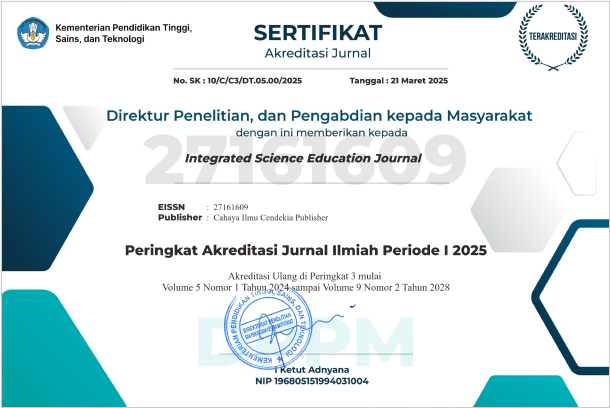Integrated Science Learning Devices on Substances and Their Characteristics Material with Character Enrichment Through the Application of Problem-Based Learning
Abstract
Purpose of the study: The purpose of this study is how to find out the process of developing learning devices using the PBL model with character enrichment in the substance material and its characteristics which were developed according to experts.
Methodology: The research design used by researchers is a quantitative research type of quasi-experimental design using a pretest-posttest control group design. It is done to investigate causal hypotheses about causation that can be manipulated by comparing one or more experimental groups that are treated with one comparison group that is not treated.
Main Findings: Based on the analysis of the data and the discussion above, it can be concluded that the students' ability in science subjects on the substance and its characteristics is in the good category. This shows that the application of problem-based learning models can improve students' thinking skills. This is reinforced by testing the hypothesis through the independent sample t-test that there is a significant difference between before being given treatment and after being given treatment
Novelty/Originality of this study: Following the era of the industrial revolution 5.0, character-based learning must be developed. Therefore, this research produces science learning tools with problem-based learning in the material and its characteristics.
References
D. Darlan., S. S. Pettalongi., and R. Rustina, “The Roles of Islamic Education in Building Students’ Character within Indonesia Public Schools,” International Journal of Contemporary Islamic Education, vol. 3, no. 2, pp. 21-39, 2021.
E. V. Intania., and S. Sutama, “The role of character education in learning during the COVID-19 pandemic,” Jurnal Penelitian Ilmu Pendidikan, vol. 13, no. 2, pp. 129-136, 2020.
A. Rohaeni., I. Wasliman., D. Rostini., and Y. Iriantara, “Management of Noble Moral Education for Madrasah Aliyah Students at Persatuan Islam Boarding School,” Journal of Industrial Engineering & Management Research, vol. 2, no. 4, pp. 154-171, 2021.
R. W. Astuti., H. J. Waluyo., and M. Rohmadi, “Character education values in animation movie of nussa and rarra,” Budapest International Research and Critics Institute-Journal (BIRCI-Journal), vol. 2, no. 4, pp. 215-219, 2019.
A. Ar, “The implementation of character education through contextual teaching and learning at personality development unit in the Sriwijaya University Palembang,” International Journal of Education and Research, vol. 2, no. 10, 2014.
M. Sailer., and L. Homner, “The gamification of learning: A meta-analysis,” Educational Psychology Review, vol. 32, no. 1, pp. 77-112, 2020.
S. L. Khoiriyah, “The correlation among attitude, motivation and speaking achievement of college students across personality factors,” OKARA: Jurnal Bahasa dan Sastra, vol. 10, no. 1, pp. 78-92, 2016.
W. Wibowo, Perilaku dalam Organisasi, Jakarta: PT. Raja Grafindo Persada, 2013.
B. Singh, “Character education in the 21st century,” Journal of Social Studies (JSS), vol. 15, no. 1, pp. 1-12, 2019.
C. Pattaro, “Character education: Themes and researches. An academic literature review,” Italian Journal of Sociology of Education, vol. 8, no. 1, pp, 6-30, 2016.
A. Agboola., and K. C. Tsai, “Bring character education into classroom,” European journal of educational research, vol. 1, no. 2, pp. 163-170, 2012.
E. C. Hendriana., and A. Jacobus, “Implementasi pendidikan karakter di sekolah melalui keteladanan dan pembiasaan,” JPDI (Jurnal Pendidikan Dasar Indonesia), vol. 1, no. 2, pp. 25-29, 2017.
D. Depdiknas, Kurikulum Tingkat satuan Pendidikan (KTSP) untuk Sekolah Dasar/ MI, Jakarta: Terbitan Depdiknas, 2006.
J. Merritt., M. Y. Lee., P. Rillero., and B, M, Kinach, “Problem-based learning in K–8 mathematics and science education: A literature review,” Interdisciplinary Journal of Problem-Based Learning, vol. 11, no. 2, 2017.
S. Moutinho., J. Torres., I. Fernandes., and C. Vasconcelos, “Problem-based learning and nature of science: A study with science teachers,” Procedia-Social and Behavioral Sciences, vol. 191, pp. 1871-1875, 2015.
R. D. Anazifa., and D. Djukri, “Project-based learning and problem-based learning: Are they effective to improve student’s thinking skills?,” Jurnal Pendidikan IPA Indonesia, vol. 6, no. 2, pp. 346-355, 2017.
J. R. Savery, “Overview of problem-based learning: Definitions and distinctions,” Essential readings in problem-based learning: Exploring and extending the legacy of Howard S. Barrows, vol. 9, no. 2, pp. 5-15, 2015.
A. Rahman., I. Ilwandri., T. A. Santosa., R. G. Gunawan., Y. Suharyat., R. Putra., and A. Sofianora, “Effectiveness of Problem-Based Learning Model in Science Learning: A Meta-Analysis Study,” JUARA: Jurnal Olahraga, vol. 8, no. 2, pp. 713-726, 2023.
R. Wang, “On culinary teaching steps from the perspective of problem-based learning,” The Journal of International Management Studies, vol. 10, no. 2, pp. 5-14, 2015.
M. Sepahkar., F. Hendessi., and A. Nabiollahi, “Defining Project Based Learning steps and evaluation method for software engineering students,” International Journal of Computer Science and Information Security, vol. 13, no. 10, pp. 48, 2015.
S. S. Ali, “Problem based learning: A student-centered approach,” English language teaching, vol. 12, no. 5, pp. 73-78, 2019.
M. Akhir, J. Siburian, and M. H. E. Hasibuan, “A Study Comparison the Application of Discovery Learning and Problem Based Learning Models on the Critical Thinking Ability”, In. Sci. Ed. J, vol. 4, no. 2, pp. 84-89, 2023.
D. Cramer, Advanced Quantitative Data Analysis. McGraw-Hill Education (UK), 2003.
J. C. Trullàs., C. Blay., E. Sarri., and R. Pujol, “Effectiveness of problem-based learning methodology in undergraduate medical education: a scoping review,” BMC medical education, vol. 22, no. 1, pp. 104, 2022.
A. Markula., and M. Aksela, “The key characteristics of project-based learning: how teachers implement projects in K-12 science education,” Disciplinary and Interdisciplinary Science Education Research, vol. 4, no. 1, pp. 1-17, 2022.
D. W. S. Rahadiyani, P. A. Rivani, and F. Untari, “Implementation of Problem Based Learning Model as an Effort to Improve Student Activities and Outcomes in Temperature and Heat Materials”, In. Sci. Ed. J, vol. 4, no. 1, pp. 19-22, 2023.
E. A. M. Castro, “Analysis of Problem Solving Ability of First Middle School Students in Learning Science”, In. Sci. Ed. J, vol. 4, no. 2, pp. 43-53, 2023.
D. Alt., and N. Raichel, “Problem-based learning, self-and peer assessment in higher education: towards advancing lifelong learning skills,” Research Papers in Education, vol. 37, no. 3, pp. 370-394, 2022.
R. Mursid., A. H. Saragih., and R. Hartono, “The Effect of the Blended Project-Based Learning Model and Creative Thinking Ability on Engineering Students' Learning Outcomes,” International Journal of Education in Mathematics, Science and Technology, vol. 10, no. 1, pp. 218-235, 2022.
H. Tadjer., Y. Lafifi., H. Seridi-Bouchelaghem., and S. Gülseçen, “Improving soft skills based on students’ traces in problem-based learning environments,” Interactive Learning Environments, vol. 30, no. 10, pp. 1879-1896, 2022.
C. Der‐Thanq., D. Hung., and Y. M. Wang, “Educational design as a quest for congruence: The need for alternative learning design tools,” British journal of educational technology, vol. 38, no. 5, pp. 876-884, 2007.
K. C. Setlight., M. Betaubun., and V. Kartika, “Involving Problem-Based Learning as an Alternative for EFL Students’ Writing Improvement: A Method for Teaching Writing,” Journal of English Culture, Language, Literature and Education, vol. 11, no. 2, pp. 210-235, 2023.
F. Kiraga, “Literature Review: Efforts To Improve Creative Thinking Ability In Science Learning”, In. Sci. Ed. J, vol. 4, no. 2, pp. 77-83, 2023.
Siti Nurjannah, “Implementation Analysis of Problem Based Learning Modeland the Correlation of the Creative Attitude of Class X Students on Chemical Bonding Materials”, In. Sci. Ed. J, vol. 3, no. 3, pp. 92-96, 2022.
R. Rusman. Model-Model Pembelajaran (mengembangkan profesionalisme guru), Bandung: Rajagrafindo Persada, 2010.
T. Trianto, Model Pembelajaran Terpadu, Jakarta: Bumi Aksara, 2010
Copyright (c) 2023 Jenni Sari, Rayandra Asyhar, Sri Purwaningsih

This work is licensed under a Creative Commons Attribution-NonCommercial 4.0 International License.
Authors who publish with this journal agree to the following terms:
- Authors retain copyright and acknowledge that the Integrated Science Education Journal is the first publisher licensed under a Creative Commons Attribution 4.0 International License.
- Authors are able to enter into separate, additional contractual arrangements for the non-exclusive distribution of the journal's published version of the work (e.g., post it to an institutional repository or publish it in a book), with an acknowledgment of its initial publication in this journal.
- Authors are permitted and encouraged to post their work online (e.g., in institutional repositories or on their website) prior to and during the submission process, as it can lead to productive exchanges and earlier and greater citation of published work.







.png)
.png)






